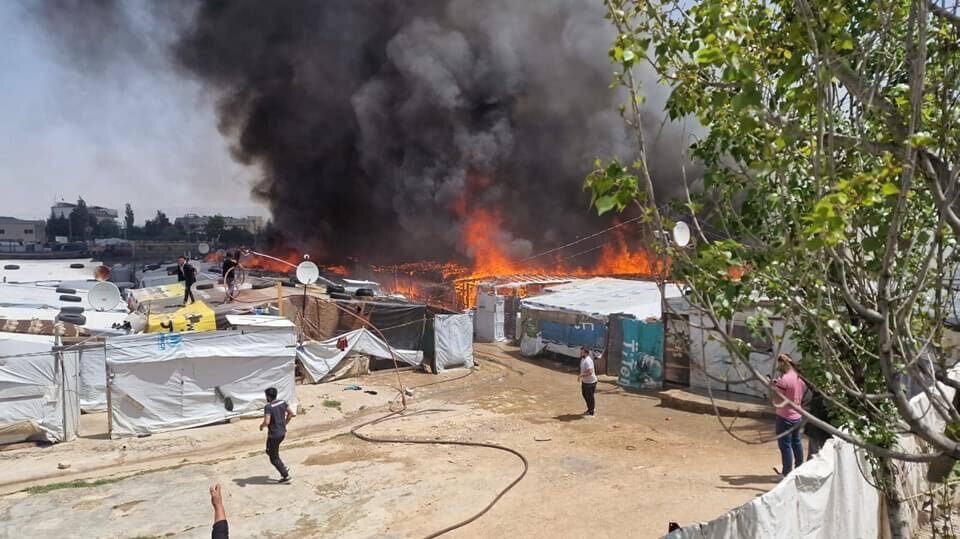Anti-Syrian Sentiment Intensifies in Lebanon Amid Economic Crisis
Following the murder of a Lebanese official, Syrian communities in Lebanon have become targets of increased hostility and aggression
[Beirut] Tens of thousands of Syrians in Lebanon have seemingly vanished. The businesses where they once worked have closed. Trash accumulates around the bins. Fewer ramshackle motorbikes dot the streets of Beirut. Many Syrians in Lebanon have gone into hiding. After over a decade in Lebanon, many Syrians—some as refugees, others not—now avoid public spaces for their own safety a surge in anti-Syrian sentiment.
On April 7, Pascal Sleiman, an official with the Lebanese Forces, was killed by four men allegedly attempting to steal his car as he returned from a relative’s funeral. His body and car were then transported to Syria, where the attackers originated. Sleiman headed the Lebanese Forces’ Jbeil district office on Lebanon’s predominantly Christian northern coast. His party contested the Lebanese Army’s account of his death, announced 24 hours after his disappearance, suggesting it was politically motivated.
His supporters reacted swiftly. Dozens of men in Jbeil, also known as Byblos, and other areas across Mount Lebanon began targeting Syrians. “The Lebanese Forces are directing their supporters’ anger toward Syrians, who are easy targets due to their lack of protection,” said Wadih al Asmar, president of the Lebanese Center for Human Rights (LCHR). This group has closely monitored attacks against Syrians since Sleiman’s death.
The Lebanese Forces are directing their supporters’ anger toward Syrians, who are easy targets due to their lack of protection
“Violence against Syrians has surged through organized attacks by thugs since this incident,” he told The Media Line. The violence has manifested in various forms. Residents in Beirut’s Christian neighborhoods like Achrafieh, Jdeideh, and Sin el Fil have threatened Syrians to vacate their homes by Saturday night or face consequences. Syrians face random street attacks. Based merely on appearance, Lebanese individuals have insulted, humiliated, assaulted, and even kidnapped Syrians.
A group of youths restrained a Syrian food delivery man and forcibly shaved his hair and beard. The ordeal was filmed and shared on social media, where the perpetrators were hailed as “national heroes.”. Several municipalities have imposed curfews and movement restrictions specifically targeting Syrians. Security forces have been stopping Syrians on the roads, threatening them with deportation.
Syrians have become the scapegoat for the crisis Lebanon is going through
“Syrians have become the scapegoat for the crisis Lebanon is going through,” al Asmar stated. “The tensions between local Lebanese and Syrians have increased in the past three years due to the rise of hate speech by media, politicians, and religious leaders who are hammering the population with this message that Syrians are the reason for our poor situation,” he added.
For the past four years, the Lebanese economy has faced its worst crisis since the 1850s, according to the World Bank. The United Nations estimates that about 75% of Lebanon’s population lives below the poverty line. For the 1.5 million Syrians present in the country, it is over 90%.
Approximately 800,000 Syrian residents in Lebanon are registered refugees with the United Nations High Commissioner for Refugees (UNHCR). Since the Syrian civil war began in 2011, Lebanon has had the world’s highest per capita refugee population.
“UNHCR calls on Lebanese communities to refrain from wrongfully and collectively blaming Syrian individuals and protect them from being targeted for a heinous crime they did not commit,” said Dalal Harb, a spokesperson for the agency.
Harb told The Media Line that “local residents in different Lebanese towns are issuing threats of mass evictions against Syrians, creating an environment of fear and intimidation.”
“These random acts of violence and threats against Syrians have instilled panic among Syrian families in Lebanon,” she added.
Besides the tragic circumstances for Syrians in Lebanon, “the most vulnerable community in the country” according to al Asmar, the LCHR president, many are also worried about where all this violence will lead to. “Our fear is that if these clashes with the Syrians continue, they will shift from a clash of Lebanese against Syrians to a confessional clash and to a Lebanese vs. Lebanese clash,” he added.
The Lebanese government must curb hate speech and restore peace, as violence won’t resolve the refugee issue
“The Lebanese government must curb hate speech and restore peace, as violence won’t resolve the refugee issue,” al Asmar stated.
For over 12 years, thousands of Syrians in Lebanon have been neglected by locals and institutions alike. Only local and international organizations have come to their aid. “Political parties have exploited Syrian refugees for their agendas, leading to today’s dire consequences,” the LCHR president concluded.


